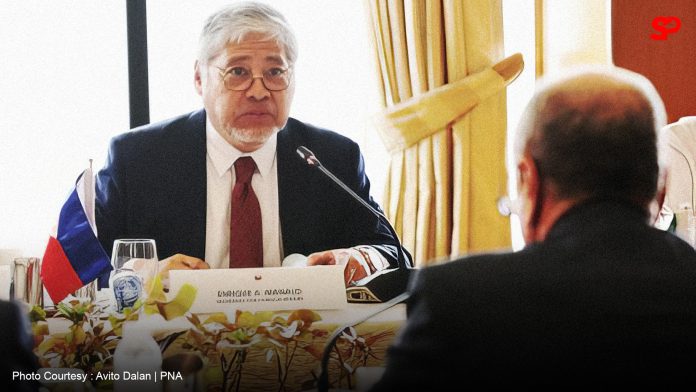MANILA – The Department of Foreign Affairs (DFA) rang in 2025 on a good note, closing out a leap year accentuated by its diplomatic strides that saw it skillfully navigating complex shifts in regional geopolitics while continuing to advance national interest.
From an arduous work at the negotiating table, the Philippines in July was able to reach a “provisional arrangement” on the country’s rotation and resupply missions in the Ayungin Shoal.
This marked the first formal deal reached between the Philippines and China on the West Philippine Sea feature, a feat that came only a few weeks after the June 17 tense confrontation between the Chinese Coast Guard and Filipino vessels carrying supplies to the troops stationed at the BRP Sierra Madre.
The standoff, the worst and most violent in recent years, injured a Filipino soldier and caused severe damage to the Filipino vessels that triggered public outcry and condemnation from the international community.
For the DFA, the “provisional arrangement” among other diplomatic initiatives served as a testament to the Marcos administration’s commitment to a peaceful approach to defending Philippine interests over the West Philippine Sea.
As part of Manila’s promotion of a rules-based order, especially in the maritime space, the government also submitted its formal claim over an extended continental shelf (ECS) in the Western Palawan region in the West Philippine Sea before the UN Commission on the Limits of the Continental Shelf in June.
In his State of the Nation Address, President Ferdinand R. Marcos Jr. himself said the government would continue asserting its rights over the resource-rich waters while “continuously try to find ways to de-escalate tensions” without compromising the Philippine position.
Anchored on its independent foreign policy, Foreign Affairs Secretary Enrique Manalo said the country would continue choosing “the path of diplomacy and the rule of law in addressing national security challenges”.
“The bedrock of our foreign policy is the strengthening of an open, inclusive, and rules-based order, grounded on the sovereign equality of states and governed by international law,” he said at a recent year-end reception for the diplomatic corps,” Manalo said.
“As President Marcos Jr. has clearly enunciated on a number of occasions, a rules-based order provides a credible legal regime that guarantees just and equitable access to the global commons, especially in the oceans. The predictability and stability it engenders provides an enabling environment for nations, large and small, intent on pursuing their legitimate interests,” he added.
Productive year
In the diplomatic arena, 2024 had been a banner year for the Philippines’ pursuit of reinvigorated relations with long-standing and new partners.
The DFA began the year with engagements in Africa and Manalo’s participation in the 19th Non-Aligned Movement Summit in Kampala, Uganda, and held 20 bilateral meetings with nine African partners.
In the succeeding months, the DFA conducted high-level engagements with countries, such as Kazakhstan, Lithuania, Mongolia and Ukraine.
In the first Philippines-Japan-United States Trilateral Summit between Marcos, President Joe Biden, and former Prime Minister Kishida Fumio in April, the three states unveiled a joint vision for the future, underscoring the importance of collective responsibility in advancing an open, inclusive, resilient and prosperous region.
The Philippines and South Korea also issued a joint declaration, announcing the elevation of relations to a Strategic Partnership.
On December 31, 2024, the free trade agreement between Manila and Seoul formally took effect, granting preferential duty-free entry on at least 11,164 Philippine products.
For the past 12 months, Manalo has also held over 100 bilateral meetings with his counterparts, including from Greece, Cyprus, Italy, Brazil, the Holy See, Hungary, Lithuania, the Netherlands, Singapore, New Zealand, the United Arab Emirates, the US, India, Germany, Malaysia, Thailand and Japan.
“These engagements have allowed us to enhance cooperation on regional and international issues, and help promote our national concerns,” he said.
“We are expanding our network of cooperation by also reaching out more to our partners in the Pacific and South America. Strengthening South-South Cooperation remains high on our foreign policy agenda, and we are committed to putting the Pacific into the lndo-Pacific,” he added.
The Philippines also opened its new embassies in Bogota, Bucharest, Dublin, and Helsinki, forming a crucial part of its efforts to expand its diplomatic reach.
“We hope to establish more resident Embassies and Consulates General in the near future, thus bolstering our ability to promote Philippine interests and serve overseas Filipinos more effectively,” Manalo said.
Still, at the heart of DFA work is the protection of Filipino welfare abroad.
In countries marked by unrest and conflict, especially in the Middle East, the DFA flew in more than a thousand distressed overseas Filipinos back to the Philippines.
The transfer of Filipino death row convict Mary Jane Veloso, a victim of human trafficking and exploitation, to Philippine custody before Christmas also demonstrated the efficiency of Philippine diplomacy.
From years of appeals for the Indonesian government to grant leniency to the Filipina, talks between the two countries finally culminated in a “practical arrangement” that saw her return to the country after more than a decade of incarceration in the Southeast Asian state. (PNA)

